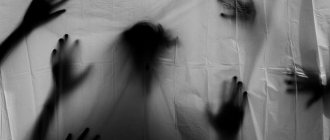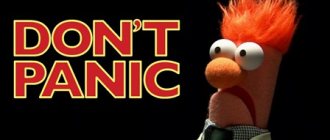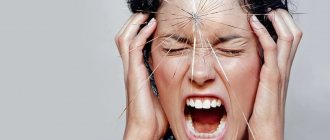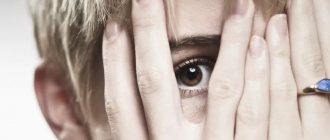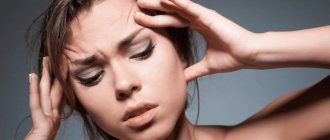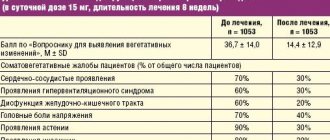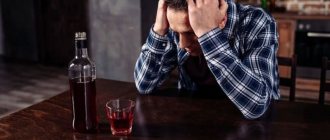Home>Articles>Panic attacks after alcohol
quick menu (hide)
- Causes of panic attacks
- Symptoms of occurrence
- Physical manifestations
- Treatment of panic attacks
- Aids
- Medications
- Sport as treatment
Panic attacks and alcohol - these factors are not at all inextricably linked. In some people, this condition is a consequence of taking minimal doses of alcohol (no more than 30 grams per day). This amount is considered by many people to be a simple antidepressant, due to its ability to stop the release of the anxiety hormone - adrenaline. But on the other hand, such a dose is poison, as it causes mental problems, provoking a conflict between the conscious and subconscious “I” of a person.
How does a panic attack form?
The only cause is the consumption of alcoholic beverages. Panic attacks after alcohol what to do? - only those people who have learned from an early age that alcohol is an antidepressant can ask such a question. The person sought to drink alcohol to stimulate positive emotions. But he will only receive:
- imbalance between the autonomic and sympathetic nervous systems,
- threat of delirium tremens
- and panic attacks.
The mechanism for the formation of the negative effects of psychoactive substances, which include alcohol, along with drugs, is quite simple. Ethanol can saturate the brain with dopamine. After which the nervous system is exhausted and its production weakens. for natural dopamine levels to return.
Those who drink alcohol regularly reduce dopamine levels to critical levels, which is a prerequisite for a panic attack.
Many people mistakenly perceive blocking dopamine antagonists with alcohol as a positive thing. A one-time release of dopamine momentarily immerses a person in euphoria and reduces the perception of anxiety and fear. In the absence of these feelings, the body triggers a reaction mechanism that ends in an attack.
Important!
A panic attack is an attack of inexplicable, severe fear. It is accompanied by a feeling of horror and elements of disruption of the autonomic nervous system.
Particularly severe attacks develop in a person with a hangover. This is a consequence of his poisoning with the destruction products of alcohol and standard experiences. A severe hangover attack causes wild fear in a person, increased adrenaline levels, and uncontrollable anxiety . In some cases, the attack is associated with the desire to quit drinking and justifying oneself for an unsuccessful attempt.
Originally Answered: Why do I have panic attacks after drinking alcohol? – simple. This is a disagreement between the desire to drink alcohol, which becomes a consequence of developing alcoholism, and the understanding that alcohol is poison. An anxious and suspicious personality makes the attack emotionally charged, causing increased fear.
Reasons for formation
The liver is the main organ responsible for neutralizing alcohol.
To oxidize ethanol and convert it into acetic acid with subsequent removal from the body, the synthesis and reduction of nicotinamide adenine dinucleotide is required. When there is an excess of alcohol, the liver resource is not enough for this and the production is blocked:
- citrate synthetase,
- isocitrate dehydrogenase,
- and oxoglutarate dehydrogenase - substances necessary for the production of pyruvate..
A lack of the final product of glycolysis, pyruvate, is detected in the body and glucose synthesis stops. The brain stops eating normally because the liver cannot synthesize glucose. Hypoglycemia can cause shock, coma, and death . But this, as a rule, does not happen. Just a person who has had too much alcohol begins to feel:
- fatigue,
- weakness,
- decreased attention,
- inability to concentrate
- and intense fear.
An increasingly deteriorating condition gives rise to thoughts of death in a person. And they are the ones who give rise to panic.
The nervous system suffers from a hangover as much as the liver and brain. Disruption of the nervous system affects the patient's behavior. If immediately after drinking alcohol a person may experience a feeling of pleasure, joy and euphoria and becomes inadequate, overexcited and aggressive, then after some time he experiences a reverse reaction.
The cause of fear may be additives to strong alcohol. To sweeten strong alcohol and give it a recognizable specific taste, zinc is added to it. A large number of sweet cocktails can aggravate the situation. Dark drinks, such as bourbon, have a stronger effect on the body than light ones, making the hangover more severe and the fear more intense.
Severe anxiety has been reported after drinking large amounts of whiskey or tequila. Fusel oils are not removed from them to impart taste and aroma. And everyone knows that it is they that lead to poisoning of the body and disruption of its proper functioning.
Another cause of severe fear is oxygen starvation of the central nervous system cells. Tissue cells, including nervous tissue, due to the large loss of fluid by the body, begin to accumulate and retain fluid. This causes mild swelling of tissues, including the brain. This leads to disruption of blood supply, delays the flow of oxygen to the brain and causes DEP. This disease can lead to attacks of unreasonable anxiety or fear.
A person becomes apathetic, he is overcome by physical weakness, apathy and anxiety. This is exacerbated by feelings of shame or guilt if he can remember his actions.
Thus, fear or anxiety is a consequence of severe poisoning of the body - the brain, central nervous system, liver and kidneys. The central and peripheral nervous systems are overloaded.
Symptoms
Panic attacks caused by alcohol initially do not manifest themselves in any way. Everything inside a person is boiling. The patient does not know where to go to relieve the condition. While physical pain can be relieved with medications, there is no way to cope .
Such attacks can be observed in people of a certain type:
- those suffering from hypochondria, afraid of injury, illness and infection,
- prone to hysteria
- suffering from obsessive ideas
- epileptics.
The possibility of an attack is higher in people who have congenital or acquired diseases of the heart and blood vessels as a result of drunkenness. Alcohol causes an increased fear of death . Everything goes in a circle: fear causes the synthesis of catecholamine, which leads to an attack.
Systematic alcohol abuse is the cause of pathologies of the endocrine apparatus. Adrenal tumors, thyrotoxicosis and alcohol abuse stimulate the release of adrenaline, which causes a panic attack.
Drinking alcohol causes abnormalities in the functioning of some internal organs, increases phobias, aggravates mental illnesses and depressive states. The short-term pleasure from drinking alcohol is replaced by:
- apathy,
- withdrawal into oneself,
- anxious observation of the inner world,
- fears of developing alarming symptoms.
Stages of withdrawal syndrome
The main cause of the condition is stopping alcohol consumption or significantly reducing the dosage. Depending on the stage of the condition, a number of dangerous symptoms occur, disruption of the functioning of all organs and systems, and the release of adrenal hormones. There are four stages:
- Light heaviness. Accompanied by a bad mood, a feeling of depression, decreased appetite, insomnia, increased sweating, asthenia.
- Medium severity. The patient becomes irritable, depressed and even aggressive. Accompanied by numbness, headache and dizziness. Often the condition is accompanied not only by insomnia, but also by vivid nightmares. In this state, it is very difficult for a person to resist the desire to drink alcohol.
- Strong heaviness. This condition is accompanied by headache, numbness, nightmares become more vivid, and insomnia becomes severe. The patient behaves aggressively with others.
- Withdrawal syndrome. Represents a critical stage. All of the above symptoms are accompanied by a feeling of anxiety and restlessness. There are frequent cases of hallucinations. Common symptoms also include persistent feelings of guilt. It is extremely difficult for a person to restrain himself from drinking alcoholic beverages.
When alcohol withdrawal occurs, how long it lasts depends on many factors. The main one is the stage of the condition and duration of consumption of alcoholic beverages. In mild to moderate stages, relief occurs within a few days. It can take up to several weeks to recover from severe withdrawal symptoms. a severe form of the disease in medical institutions. Without proper supervision, the patient can cause harm not only to himself, but also to others.
Physical manifestations of panic attacks
Before a person feels an attack of overwhelming fear, he experiences:
- dry mouth,
- lump in throat
- lack of air,
- increased sweating,
- chills,
- numbness of hands and feet,
- frequent urge to urinate.
The symptoms of the onset of an attack vary from person to person. There may be fear of death, madness, severe anxiety, an incessant feeling of tension, and increased blood pressure. Fainting also .
Attacks are not excluded in people with reduced immunity. Alcohol is a carcinogen that can disrupt the human immune system.
Signs of attacks after drinking alcohol do not have two components:
- presence of intoxication,
- vegetative-vascular disorders.
The second component is characterized by extensive symptoms, including a nonspecific complex - damage to the gastrointestinal tract, respiratory organs, heart and blood vessels, and genitourinary area. cannot be detected during examinations . Doctors attribute this to a high level of anxiety, which is the impetus for the appearance of symptoms.
Treatment of panic attacks after alcohol
It will not be possible to eliminate an attack that has already begun on your own. There are no magic cures for this disease. Taking antidepressants, physical activity, massage - all this is not serious. The main thing for a person prone to attacks is to work on himself.
First you need to give up alcohol. If a panic attack was observed after each dose, it means that alcohol in any quantity and for any reason is prohibited .
It has been noticed that the more a person strives to get rid of attacks, the higher their strength and frequency.
Diagnostics
To make an accurate diagnosis and identify the stage of the condition, consultation with a therapist, psychiatrist, narcologist and other specialized specialists is recommended. Diagnostic measures include:
- Anamnesis collection. For an accurate diagnosis, the doctor must find out the duration of alcohol intake, the main symptoms and complaints of the patient.
- Inspection. The neurologist must determine the integrity of reflexes and coordination of movements. The doctor assesses the condition of the skin, mucous membranes, sclera, and measures pulse and blood pressure.
- Laboratory research. The functioning of the body can be determined by general and biochemical analysis of blood and urine. To assess the condition of internal organs, liver and kidney tests, hormone tests, as well as ultrasound of the abdominal organs, thyroid gland and heart can be additionally prescribed.
Based on research data, alcohol withdrawal syndrome is diagnosed, the treatment of which depends on the stage and concomitant diseases.
Aids
The following are well suited as aids to help reduce the power of attacks:
- Taking vitamin-mineral complexes (injections of vitamins B and C),
- Accelerating the removal of alcohol breakdown products from the body - taking sufficient quantities of water, juices, fruit drinks, etc.
- Breathing exercises.
- Any water procedures, including contrast showers.
This list can be supplemented independently by including everything that can evoke positive emotions in a person and reduce the level of anxiety. You can't try to reduce anxiety by drinking alcohol. This will only increase the attack.
Medicines
There are no medications that can completely get rid of attacks. You should not take painkillers, antivirals or other medications and think that they will relieve a person from attacks. Seizures are not a disease and cannot be cured by taking a pill.
There are medications that can suppress anxiety, reducing the symptoms of panic. You can use folk remedies - soothing decoctions of medicinal herbs.
You can take medications only under the supervision of a doctor - a neurologist or psychotherapist.
The list of medications that a doctor can prescribe includes:
- sedative (based on plant components - valerian, motherwort),
- a tranquilizer, anxiolytic or a synthetic broad-spectrum agent (phenazepam, afobazole, seduxen).
But addiction to medications quickly develops. The doctor may prescribe an adrenergic blocker. But all these remedies are not a panacea. They don't always help. Rather, they are designed to save others from possible manifestations of unmotivated aggressiveness on the part of people susceptible to attacks. Medicines help keep the patient either in a state of semi-asleep or in a very relaxed state. At the same time, the person is conscious. The fear of not being able to gather oneself and physically respond to an ever-increasing threat can only intensify the manifestation of panic.
Medicines can only be taken in a state of absolute sobriety. Otherwise, the combination of alcohol and sedatives may cause unpredictable reactions. To the point where the person falls into a coma.
Classification
To identify the optimal treatment method, it is convenient to use a classification based on the type of withdrawal syndrome:
- Regenerative. The safest option. The patient recovers on his own, and the unpleasant symptoms last only a few days. No damage was caused to organs and systems. Does not require specialist help.
- Stable. The course of the condition is predictable, the symptoms gradually go away. If you follow the treatment recommendations, the body is fully restored. The likelihood of complications occurring is minimal.
- Intermittent. A dangerous condition in which periods of improvement in well-being are followed by periods of aggravation of the situation. Treatment in this case should be carried out under the supervision of a specialist who can in a timely manner . If you follow the recommendations, there is a chance of complete recovery of the body.
- Degenerative. It consists of a gradual improvement of the condition. The most unfavorable scenario for the development of alcohol withdrawal syndrome. Requires professional treatment in a hospital. And even after treatment, there remains a high probability of relapse.
In order for alcohol withdrawal syndrome ICD 10 to cause minimal damage to the body, it requires timely and professional diagnosis. Only an experienced specialist will be able to accurately classify the condition in order to prescribe effective treatment.
Sport as treatment
Physical activity is an excellent opportunity to stop drinking alcohol and eliminate panic. Any available type of is welcome, from swimming and yoga to cycling, running, Nordic walking, skating or skiing. Physical activity helps a person:
- relax,
- eliminate nervous tension,
- relieve anxiety.
Physical education can improve the functioning of the endocrine system, increase dopamine levels, and enhance good mood.
If the attack catches a person at home, then breathing exercises will help reduce its manifestations. It helps stabilize the condition. Relieve tension, regulate the level of carbon dioxide in the blood. There is no need to breathe particularly quickly or deeply. Hyperventilating the lungs can only worsen the condition. Folding your palms and bringing them to your lips will help you come to your senses. Inhale in counts of 4, and exhale in counts of 6. This will increase the level of carbon dioxide in the blood and help trigger the parasympathetic nervous system. Which promotes relaxation.
If all else fails, you must call an ambulance.

